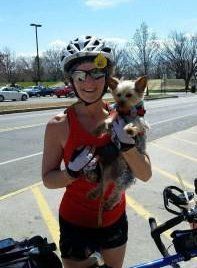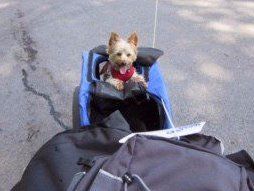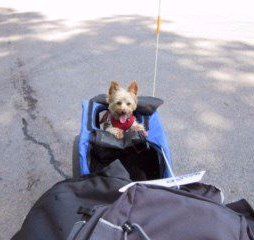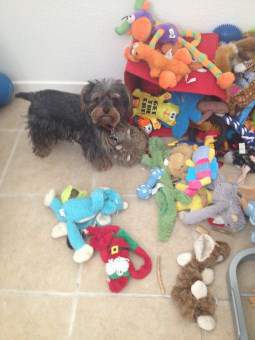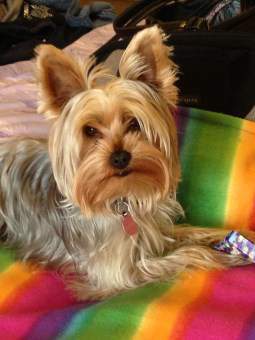Socializing a Yorkshire Terrier
Overview
Lots of owners want to know how to socialize their Yorkie and just as many aren't sure exactly what that even means. If a Yorkshire Terrier is great with visitors but doesn't play well with other dogs at the park, does that mean that he's not socialized?
If he gets along great with other animals, but doesn't do well on walks, is socialization training in order or would it be a command issue?
And for owners who realize that training is needed, there may be questions about where to start and what to do.
Age is another factor, as many wonder if this is something that needs to be done when a Yorkie is a puppy or if socialization will work with adult or even senior dogs.
This section will cover:
- Exactly what socialization is
- Signs that socialization training is needed
- The 3 top benefits for both owner and dog
- The best age to start, if training is effective for all life stages
- How to socialize a Yorkie for the most common issues
- The 4 top tips to remember
Please note:
YorkieInfoCenter is reader-supported, and some of the product suggestions on this page are affiliate links. As an Amazon Associate we earn from qualifying purchases. This is at no extra cost to you and helps us continue providing free, high-quality information.
Nacho
This amazing Yorkshire Terrier accompanied his owner Pat Fratangelo on a 750 mile bike ride from the Finger Lakes in New York State to Virginia and back! He rode in his own cart behind Pat's bike. They did 411 miles of training beforehand; so during the race this Yorkie had 1000 miles of time on the bike!
Photo courtesy of Pat Fratangelo
What Socialization Actually Means
The dictionary defines socialization as "a continuing process whereby an individual learns the norms, values, behavior, and social skills appropriate to his or her social position" and while this is referring to humans, this comes quite close in describing what this means for our canine family members.
With our pets, the goal is to make them very familiar with all aspects of the world that they encounter. The main elements that dogs need to be socialized to are:
- Other dogs
- People of all kinds (this includes visitors to the home and strangers that they encounter while out and about with you)
- Environments (different settings such as crowded outdoor markets, the beach, stores, etc.)
- Noises
- Traffic
No matter the element or trigger involved, the main idea behind this sort of training is that a dog is slowly introduced and exposed to something. It is done in slow, gradual steps.
As a dog starts to become familiar with the person, place or thing, he is exposed either for longer intervals of time or in a more personal way and this continues in measured intensity until he is so accustomed to the element, that he stays composed during interaction and/or reacts appropriately.
Signs that a Yorkie May Need to Be Socialized
While each dog will behave differently when encountering something that triggers a reaction, in just about every case, it will be a matter of the Yorkie acting in a way that is contrary to normal and is out of character.
If a Yorkshire Terrier is naturally a quiet, calm dog you can't expect that same dog to be overly enthusiastic about any particular element. However, most dogs will display one or more of the following behaviors:
- Overly shy (cowering down, running away, hiding, staying very close to the owner, etc.)
- Nervous behavior
(shaking, antsy, looking for escape, etc.)
- Afraid (trembling, running away, growling, etc.)
- Overly alert/defensive (growling, excessive barking, jumping, over-excitement, etc.)
The Importance of Socialization
Dogs do not automatically know how to react to everything that they encounter in the world and each dog is truly unique in regard to personality; some are naturally outgoing while other are shy though this can change as the Yorkie matures.
A hyper puppy may transition into a reserved adult. And in many cases, if a dog was not presented with a situation in the past, owners simply did not know that the dog needed help with it.
For these reasons, owners should never feel bad about their Yorkie needing to be socialized, yet it is something that should most certainly be incorporated and the earlier the better.
There are 3 main reasons why socializing a Yorkie is beneficial:
1) Increased happiness for the dog- Since the way that a dog emotionally and physically responds when un-socialized will vary from being shy to feeling duress, a socialized dog is a happier dog. When able to appropriately interact with the world around him, a Yorkshire Terrier will feel at ease and confident, this gives the dog a feeling of safety and security, in both himself and his environment.
2) Less frustration for the owner
- Whether an owner reluctantly has to walk a dog that barks
like crazy at cars that go by or spends time at the dog park constantly worried about how a Yorkie is interacting, these situations will become less stressful and more enjoyable when a dog has been taught socialization.
3) No more missed opportunities
- Many owners limit access to what a Yorkie reacts badly to and this means that both owner and dog are missing out on something. This may mean less walks to more interesting places or steering clear of the dog park. When places to go, things to see and people to visit with are not ruled out due to a dog's inability to stay composed, this means that a Yorkie's world can expand to include more interesting things.
Age
As with many elements, the younger a dog is taught something, the easier it is.
Older dogs are more set in their ways and habits have been established. However, a Yorkie of any age
can be trained to better handle situations.
One of the keys is to remember that this is a very slow, gradual process. It is done in steps, with an owner looking for cues that a dog is adapting well before moving on to a more intense level of exposure.
For this reason, dogs that are resistant may need to remain in a certain phase for a longer period of time before taking things 'up a notch'; however in the long run there should be improvement no matter how old the dog, with the exception of some seniors (more ahead).
Here is an overview of what to expect:
Puppies
- Everything is new to a puppy and many Yorkie pups may appear to take things in stride.
A new person? No big deal. Oh, a large dog came over to say hello? Hi… okay, moving on! And what can make owners take a step back and worry is that an older puppy that never seemed to mind anything may start to show fear, hesitation or shyness when encountering things that didn't faze him earlier.
Part of this has to do with young puppies not having full mindfulness of their environment. As they mature a bit, they start to have more situational awareness. Older puppies of 3, 4 or even 5 months old with more developed cognizance, may start to respond quite differently to other animals, people, noises, etc.
Adults
- With adult dogs, a fear may have been building up for a while, a change could now expose a Yorkie to a stimuli (moving to a new home, having a different schedule, etc.) or owners may have inadvertently avoided certain triggers that are now being explored.
In any case, while many habits have been established by the 1 year mark, this in no way means that an adult Yorkshire Terrier cannot be trained. In fact, since puppies
often have a casual reaction to many things, it is often with adults that owners start to notice that some socialization is needed.
Seniors
- A dog of just about any age can be socialized, however with seniors it is important to note that in some cases it is better to leave things as is. For example, an older dog may have a lower tolerance for noisy children, hyper puppies or crowds of people. This sort of behavior is expected for senior dogs; to try and change an older dog's level of patience back into what it was when he was younger will only cause stress to the situation.
For seniors like this, it is best to work with the dog's preferences and help him avoid triggers that he finds intolerable. Making sure that he has a quite area to retreat to where he can rest undisturbed and not forcing him into situations that he is no longer comfortable with is often the best course of action.
How to Socialize a Yorkshire Terrier
There are 2 main aspects to socialization training:
1) Exposure to as many elements as possible.
This is particularly true for puppies, though if an older dog has been rather sheltered, this will be applicable as well. The idea is to make a Yorkie pup familiar to as many elements as possible.
This includes:
- Surfaces -Sand, soil, grass, carpeting, hardwood flooring, pebbles, etc.
- Noises -Everyday household noises such as the vacuum, washing machine, blow dryer, doorbell, etc. and outdoor noises such as cars, birds, sirens, etc.
- Grooming -Being brushed, all parts of the body manipulated and touched including paws, tail and teeth (super important for dental cleaning). Being bathed and dried is part of this as well.
- Situations - From crowded outdoor markets to parks to pet supply
stores, with an array of different people, sounds and even other animals, it is important to expand your Yorkie's world as much as possible. Puppies that are brought to all sorts of places, seeing and meeting a variety of people often do not need specialized training as they age.
Rocket, 3 and 1/2 years old
Photo courtesy of Karen Lucas
2) Training for a specific trigger.
As a Yorkie settles into his/her final, adult temperament, owners may realize that the dog needs help with a certain element. Alternatively, many re-homed older adult Yorkies from shelters
may have never learned to socialize with other animals or may be shy
or act defensive with people outside the family.
In any case, the training steps will usually be the same:
1.
A slow introduction.
It's best to think about this like dipping a toe it the water and slowly wading in as opposed to diving into the deep end. Whether a Yorkie needs to get used to something new or an owners is trying to get a dog to stop overreacting to something, it is best to start with a clean slate of a short introduction.
2. Continual exposure.
As mentioned above, many owners avoid things that trigger their Yorkie to bark excessively, jump up or otherwise behave negatively. And owners of shy, nervous dogs may avoid things to prevent their Yorkie from being stressed out. However, when a dog rarely sees something, he is much more apt to react inappropriately.
When a dog sees or hears something often, eventually it becomes 'normal'. Once it loses its appeal, a dog often stops reacting. For things that may scare a dog, such as traffic along a walkway, continual (and safe) exposure to this teaches a dog that there is no actual danger.
3. Small gradual steps.
While you want to allow a Yorkie to become familiar with a certain element, this needs to be done in small, gradual steps. You'll want to start off with just 5 minutes or so, and work your way up. This can be for interaction with other dogs, walking on a busy road, learning to be in a crowd, etc.
Adding on 5 minutes at a time often works well. Only move forward if the dog shows that he is ready. If socialization is practiced each day, it may be just 1 to 2 weeks for each 'time jump'.
Also, prepare for some pauses or even taking a step back. Each dog has their 'breaking point' of when something is too overwhelming. After all, you can't expect a Yorkie to behave perfectly in a room of visitors for hours on end or play with other dogs non-stop.
If you notice that your dog is showing signs of having enough, cut back on the time for a while or think about making a shorter time be your dog's limit of interaction.
4. Ignore the bad, reward the good.
You've probably heard this before in regard to other sorts of training tips
and this simple advice is very effective for socialization as well. This works remarkably well for barking at visitors, barking at other dogs, acting out of control while out on walks, etc.
As you ignore unwanted behavior and offer a reward for appropriate behavior, dogs start to understand and eventually want to do as you expect.
In regard to a Yorkie acting fearful, shy or nervous, you will have an instinct to cuddle, protect and soothe your dog and this is totally understandable. However, if there is no real danger, when you do this it sends a message that the dog is correct in assuming there is a threat. For this reason, while it will go against your inner instinct, it is best to maintain a calm demeanor, giving off a casual vibe that nothing is wrong and your dog will learn to pick up on that.
Remember that he looks to you for signs; and this includes both your actions and your words.
Specific Socialization Training
Here are a couple of examples regarding the most common reasons for a Yorkie needing some socialization training:
Barking while walking
- Some Yorkies feel the need to be extraordinarily vocal toward everything that they see while out and about. For this type of socialization training, you'll want to have your Yorkshire Terrier on a harness
(not just a collar). Plan on a short walk of 5 to 10 minutes. Also, have a good amount of small treats tucked into your pocket.
With your Yorkie to your left, keep the leash short so that he is to your side and not ahead of you. Walk at a pace that is comfortable for your dog and when he barks, keep walking. With the harness distributing weight across his back, shoulders and chest and not his neck, he will not be injured as you continue on.
Please note:
The only exception to this, is if the Yorkie barks at another dog.
Why?
In many cases, a Yorkie will bark at a dog as they near each other due to wanting to interact but not being able to. He may yap and jump up and it may seem as if it is an aggressive type behavior. For those that do NOT have a history of nipping or aggression, this is often a matter of frustration... and if owners simply call out to the other person and ask if their dog can say 'hello', it is a better option.
Unless the other owner is ill-mannered or their dog is not friendly, they will be agreeable. Once the dogs sniff each other (the canine hello), the frustration is gone and you can continue on. This is a great method to teach a Yorkie to meet other dogs. Just keep him on his leash and since he has a harness on, if there are any signs of aggression, pull him back quickly.
If there are a lot of other dogs in your neighborhood and/or if some are close by as you go but others are rather far away, you will need to make a judgement call as to which ones you will allow him to 'meet and greet'.
In regard to any other stimuli, as you are walking, any time that you pass something that used to elicit a bark but your Yorkie is quiet, offer a small tasty treat. Slow down but do not stop to do this.
After all, you taught him that whether he is calm or not, you are going to walk him at a reasonable pace. You also taught him that when he remains calm, he receives a reward. He's learned that it is in his best interest to walk alongside you without barking. And when dogs learn this important lesson, they behave in the way that you wish.
Barking and/or jumping at visitors to the house
- Unless your Yorkie makes a visitor uncomfortable with jumping, this sort of socialization training works best if the dog is not put behind a gate. You will want to start off with a short visit of just 5 minutes, as mentioned above and only add on time as your dog learns to stay composed.
Both you and your visitor should have treats hidden in a pocket.
The idea is to 100% utterly and completely ignore any barking, jumping or inappropriate acts of gaining attention. You may wonder how ignoring something can possibly help to train for it. However, this can have a big impact on a canine's perspective.
Dogs 'need' to belong. They are fully aware that they have a family (their pack) and belonging to this pack is of the utmost importance. To be banned, even temporarily, is never good in the eyes
of a dog. So, when a dog is ignored, he soon learns that his behavior needs to change.
To do this, you will want to have no eye contact and there should not be any verbal communication of any sort. No shushes or 'no's'. Any time that the Yorkie is quiet, even if it is because he has worn himself out, a treat should be given, but no interaction.
If he remains calm after 1 to 2 more minutes, then another treat, along with a 'good dog' will do. As he has more sessions of longer socialization times with visitors, this can progress to the treat, the treat with affirmation and then finally a treat with pats and more attention.
Depending on how severe a Yorkie's initial reaction is, socialization training for proper behavior with guests to the home can be successful within 10 to 15 sessions.
Phoebe, 8 months old
Photo courtesy of Tereza dos Santos ,
from Johannesburg, South Africa
4 Top Tips to Remember
1) One thing at a time. If you have a Yorkie that needs help with many differing elements, it is best to train for one before tackling another. After all, this is hard work for both of you and things will be much easier if neither you nor your Yorkie feels overwhelmed.
2) No avoidance.
Whether you have a rescued Yorkie that has never walked on grass before or a super hyper dog that barks every single time the doorbell rings, avoiding the trigger will never help the dog learn to become accustomed to it.
While you will go through an initial stage that is less than fun, it is by overcoming those hurdles that allows a dog to learn.
Unless you have a senior
that is set in his ways and has earned the right to have a lower tolerance for some things, your dog deserves the chance to acquire the skills to interact with his world.
3) Access often.
Look for cues from your dog that he is ready to move up a step to either a longer duration or more intense situation (a more crowded dog park vs one-on-one play, etc.).
While you want to avoid getting overly excited about how your dog is doing, since jumping from 10 minutes to an hour can often backfire, allowing your Yorkie to progress is part of socialization. You'll also want to look for cues that your dog is tiring out and has had enough for the day.
4) Choose your battles.
Every dog is a unique and beautiful creature and therefore, has their own distinctive personality.
Some Yorkshire Terriers will never be super outgoing dogs. And others may always have an instinct to chase after squirrels. The idea of socialization is not to change your dog's personality, but more to bring out his best qualities, allowing him a chance to gain self-confidence in what can seem - at first - to be an overwhelming world.
With you patiently by his side, your Yorkie can learn to adapt to what he has the capacity to handle and will feel secure that you will not place him in a situation that he is not equipped to manage.
Looking for a great book for socialization training?
We highly recommend The Well Socialized Dog: Step-by-Step Socialization Training for Puppies and Dogs, by Faye Dunningham. It is available on Amazon in both hard copy & kindle.

